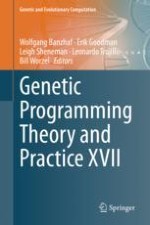2020 | OriginalPaper | Buchkapitel
9. Using Modularity Metrics as Design Features to Guide Evolution in Genetic Programming
verfasst von : Anil Kumar Saini, Lee Spector
Erschienen in: Genetic Programming Theory and Practice XVII
Aktivieren Sie unsere intelligente Suche, um passende Fachinhalte oder Patente zu finden.
Wählen Sie Textabschnitte aus um mit Künstlicher Intelligenz passenden Patente zu finden. powered by
Markieren Sie Textabschnitte, um KI-gestützt weitere passende Inhalte zu finden. powered by
